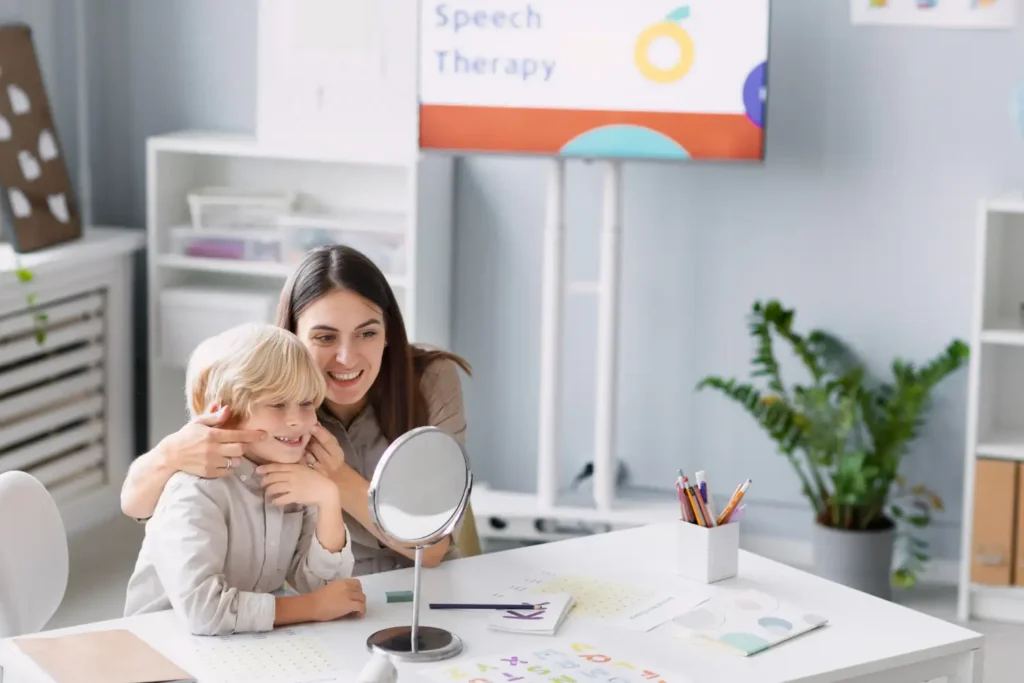
Share your communication goals — whether it's improving speech clarity, building social skills, supporting literacy, or helping with swallowing and feeding challenges.
We’ll connect you with qualified NDIS speech therapists in Melbourne who understand your needs and are available to support you.
Your speech therapist will contact you, carry out an assessment, and create a personalised plan to help you grow in confidence and communication.

NDIS speech therapy is a funded support under the National Disability Insurance Scheme (NDIS) that helps people with disability improve their communication, speech, language, and swallowing abilities. It supports individuals of all ages who experience difficulty speaking clearly, understanding others, expressing themselves, or safely eating and drinking.
Qualified NDIS speech pathologists work closely with participants, families, and support networks to deliver personalised therapy aligned with individual goals. Whether you’re supporting a child with developmental delays or an adult recovering from a brain injury, NDIS-funded speech therapy can help strengthen communication, build confidence, and improve quality of life.
With a focus on practical outcomes, NDIS speech therapy promotes greater independence at home, in school, at work, and within the community.

Every NDIS speech therapy journey starts with a detailed assessment to understand your communication strengths and challenges.

NDIS-funded speech therapy can support people who have trouble producing clear sounds. Therapy focuses on correct pronunciation to help improve everyday communication at home, school, or in the community.

Support is available for people who find it hard to understand or use spoken language. This includes building vocabulary, forming sentences, and improving listening and comprehension.

Social interaction relies on more than speaking. Therapists help individuals who find it hard to read social cues, understand body language, or respond appropriately in conversations. Therapy builds the skills needed to connect with others in meaningful ways.

For participants with difficulty swallowing, speech therapy includes assessments and strategies to reduce the risk of choking. Safe swallowing improves comfort, nutrition, and confidence during meals.

For non-verbal or minimally verbal individuals, NDIS speech therapy supports the use of AAC tools. This can include visual boards, communication books, or speech-generating devices tailored to individual needs.

Speech therapy helps build early literacy by improving sound awareness, word recognition, and sentence understanding. These supports benefit children with learning delays and adults with reading difficulties.

Participants living with conditions such as autism, stroke, or brain injury can access therapy to improve speech, voice, or cognitive-communication skills. Sessions are goal-focused and personalised for daily function.
Speech therapy under the NDIS isn’t just about speaking — it’s about building everyday independence. It can help you learn how to ask for help, communicate at medical appointments, or use visuals to order food in public. For children, it might mean joining classroom activities with more confidence or interacting during play.
Therapists also work on routines like brushing teeth or getting dressed by supporting clear instructions and responses. If verbal speech is difficult, they introduce alternative ways to communicate that suit your daily environment — whether that’s home, school, or work.
NDIS speech therapy focuses on real-world tasks that make daily life smoother and more connected.


Therapy is tailored to what matters most — whether that’s clearer speech, stronger language skills, or safer swallowing.
Sessions are planned around your daily schedule, energy, and comfort level, making therapy easier to keep up with.
Support grows with you. As your skills develop, therapy strategies adjust to keep pace with your changing needs and goals.

You’re in control. You can choose a therapist you feel comfortable with — someone who understands your needs, has the right experience, and works with your plan type.
There’s no set limit. It depends on how much funding you have and what goals you’re working toward. Your therapist can help map out a plan so the sessions fit within your budget and make the most impact.
You don’t need a referral to begin. Once speech therapy is included in your NDIS plan, you can contact a provider directly and get started.
Speech therapy usually falls under Capacity Building – Improved Daily Living. That category covers supports that help you build skills for everyday life, like communication and independence.
Your child can benefit from early support that targets first words, play-based communication, and basic language skills. Early intervention builds strong communication habits during critical stages of development.
You can often achieve the same results through telehealth if the sessions are well-planned. It’s a flexible option for people who prefer staying at home or can’t travel to appointments easily.
Your therapist can collaborate with school staff — with your permission — to make sure the same strategies are used across environments.
You’ll start with a conversation about your needs, goals, and communication style. The therapist may complete some assessments and use this session to plan what your future therapy will look like.
Your therapist may work on skills that support early literacy, like sound awareness, sentence structure, and vocabulary. These skills are essential for reading, writing, and learning in school or everyday settings.
You’ll see progress at your own pace, depending on your goals and consistency with sessions. Some people notice changes quickly, while others benefit from long-term support over time.
You may be able to use your funding for communication tools if they’re recommended as part of your therapy plan. Devices like speech-generating apps or AAC boards can be included under assistive technology.
You might hear fewer words or unclear sounds in a speech delay, but the overall development follows a typical path — just more slowly. A speech disorder often involves difficulty forming certain sounds or using speech clearly, even with age.
You may find it easier to engage in conversations when you feel confident in how you express yourself. Speech therapy supports you in developing the communication tools and social awareness needed to interact more comfortably with others.
You can receive support regardless of your primary language. Speech therapists focus on your communication goals and can adapt strategies to suit your background, including bilingual or multilingual environments.